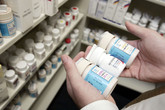Biosimilars
Switching from Basalin to Lantus effective in Chinese diabetes patients
Switching from copy biological (Basalin) to originator (Lantus) insulin glargine is effective in Chinese patients with diabetes mellitus, according to authors from the Qingdao Endocrine and Diabetes Hospital, China [1].
Safety and immunogenicity of originator and biosimilar trastuzumab
A study carried out by international researchers reported results from the HERiTAge trial of Mylan/Biocon’s biosimilar trastuzumab, Ogivri (trastuzumab‑dkst) [1].
European nurses launch biosimilar switching guide
The European Specialist Nurses Organisations (ESNO) announced on 26 June 2018 the launch of a guide for switching from reference biologicals to biosimilars.
Positive phase III results for Amgen’s infliximab biosimilar
Biotech giant Amgen announced on 27 June 2018 positive data from a phase III study of their infliximab biosimilar (ABP 710) compared to Remicade (infliximab).
Rituximab biosimilar submitted to EMA and Rituxan gains extra indication
Poland-based Mabion announced on 1 June 2018 that its candidate rituximab biosimilar (MabionCD20) had been accepted for regulatory review by the European Medicines Agency (EMA).
Biosimilars: implications for oncologists
In 2015, the US Food and Drug Administration (FDA) approved its first biosimilar, filgrastim-sndz, a biosimilar of the granulocyte colony-stimulating factor filgrastim. Since then, FDA has approved four additional biosimilar tumour necrosis factor α inhibitors, and in May 2017, the Oncology Drug Advisory Committee voted in favour of approval of an epoetin alfa biosimilar. Three biosimilar monoclonal antibodies (mAbs) have been approved in the US. Although their indications are for chronic inflammatory diseases, according to authors Robert Rifkin and Susan Peck, oncologists should become familiar with these agents, because they may need to administer these drugs for patients who have concurrent chronic inflammatory conditions [1].
Pfizer gains Japanese approval for infliximab biosimilar
Pfizer Japan announced on 2 July 2018 that it had gained Japanese approval for its infliximab biosimilar.
Positive results for infliximab and trastuzumab biosimilars
Celltrion Healthcare (Celltrion) and Samsung Bioepis have both announced positive results for their infliximab and trastuzumab biosimilars, respectively.
US pharmacies sue J&J for stifling infliximab biosimilars
Two major US pharmacy chains, Walgreen and Kroger, have sued healthcare giant Johnson & Johnson (J&J) in the US District Court Eastern District of Pennsylvania. The pharmacies allege that J&J prevented insurers from covering biosimilars of its blockbuster immunology drug Remicade (infliximab).
Biosimilars applications under review by EMA – June 2018
The European Medicines Agency (EMA) is the body responsible for approval of biosimilars within the European Union (EU). A legal framework for approving biosimilars was established in 2003. Approval of biosimilars is based on an abbreviated registration process, which allows biosimilars manufacturers to provide a reduced package of information compared to originator drugs, provided they can prove ‘similarity’ to the originator or reference drug.












